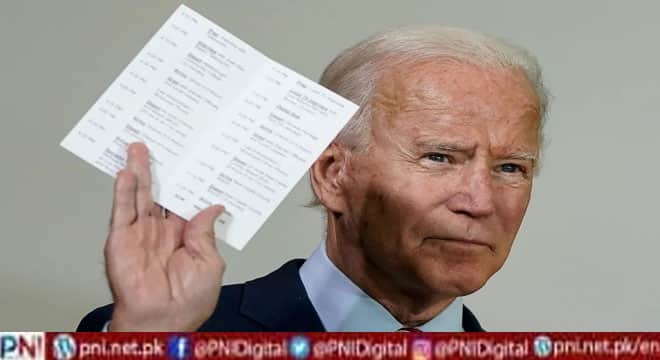Washington, April 25 (AFP/APP): President Joe Biden pledged to put the United States back on its feet after taking over from Donald Trump. How did he do?
– Overcoming political division –
Biden’s overarching campaign theme in 2020 was a vow to “heal” the national “soul” in the wake of Trump’s tumultuous presidency, capped by his unprecedented refusal to accept the results of the election.
With Congress almost evenly split and Trump continuing to loom over the Republican Party that was always going to be hard.
Biden scored narrow but important bipartisan wins in Congress, including the biggest infrastructure investment package in a generation, massive military support for Ukraine, and federal protection for same-sex marriages.
Republicans accused him of being divisive with a fierce speech in November where he called out Trump supporters, warning that “democracy is at risk.”
But Democrats did surprisingly well in midterm legislative elections a few days later, while Trump-backed candidates faced widespread rejection.
– Economic rebirth? –
Biden inherited a pandemic economy in shambles and even as Covid shutdowns eased, the collateral damage emerged.
With labor shortages, gasoline prices doubling and inflation at 40-year highs in 2022, critics compared Biden’s administration to the Jimmy Carter era in the 1970s.
However, by 2023 Biden was confounding naysayers.
Data showed inflation slowed for a ninth straight month in March to 5.0 percent, income was rising and demand for workers remains strong, with unemployment at just 3.5 percent.
The White House says massive federal investments on infrastructure, climate change and high-tech sectors like semiconductor manufacturing has already ignited an economic rebirth.
But recession and renewed inflation remain real threats.
– Restoring US alliances –
“America is back,” the Biden administration told the world on day one.
The pledge was to restore alliances strained by Trump’s unilateralism.
Biden made a quick start, with a focus on face-to-face diplomacy and emphasizing US commitment to NATO and key Asian allies South Korea, Japan and Australia.
He fulfilled a pledge to end the 20-year US war in Afghanistan, but the humiliating exit and Taliban triumph hurt the administration’s standing at home and abroad.
There was also a diplomatic hiccup when Australia abruptly scrapped a deal for French submarines in favor of a US nuclear-powered version, prompting Paris briefly to recall its ambassador to Washington.
Biden, however, has received plaudits for his handling of the crisis in Ukraine and for uniting NATO.
Relations with rival superpower China are as rocky as they were under Trump but Biden is trying to walk a diplomatic high wire that he describes as “competition, not conflict.”
– Climate change –
On his first day in the White House, Biden signed the United States back into the Paris Agreement — the global warming reduction plan that Trump abandoned.
In November, Biden attended a UN climate summit in Egypt, claiming that the United States has taken “enormous strides.” He has the giant Inflation Reduction Act to show off, with about $370 billion in clean energy incentives.
However, with climate-change-skeptic Republicans now controlling the House of Representatives, Biden’s green agenda is likely stalled.
– Race, guns, immigration –
Biden repaid the crucial role of African Americans in his 2020 election coalition by naming the first Black vice president, Kamala Harris, and the first Black woman Supreme Court justice, Ketanji Brown Jackson.
Democrats controlling the Senate have also confirmed 100 new federal judges to lifetime appointments — nearly half of them minority women.
An executive order sought to curb untraceable “ghost guns” and Congress
enacted a bipartisan law restricting gun access to people deemed dangerous. However Biden’s plea to ban so-called assault weapons often used in mass shootings has gone nowhere.
Biden has also struggled on illegal immigration.
He stopped the Trump project to build a wall on the Mexico border but with Congress unable to agree on legislative changes, he is mostly powerless to reform what he says is a “broken” system.
A new scheme to force asylum seekers to apply in US embassies in their own countries appears to be tamping down illegal border crossings but is controversial among liberal voters.
Follow the PNI Facebook page for the latest news and updates.









